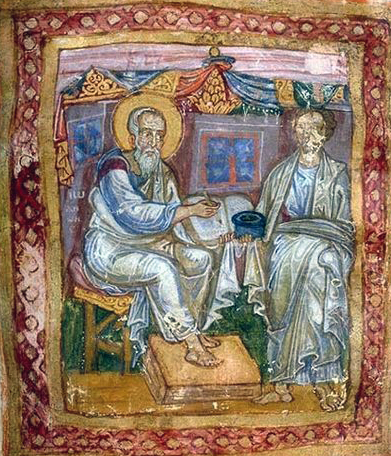Below, an abridged translation from the third volume of
Karlheinz Deschner’s Kriminalgeschichte des Christentums.
Opposition to the Old Testament
In the 2nd century, when Christians were still not exercising war as they would do permanently a little later, among them there were perhaps more opponents of the Old Testament than defenders. And none of them saw more clearly their incompatibility with the biblical Jesus doctrine than the ‘heretic’ Marcion, at least none of them derived consequences of such premise and with such success. In his Antitheses (lost) Marcion showed the contradictions and elaborated the first canon of Christian writings, based on the Gospel of Luke, the one with the least Hebrew influence, and in the letters of Paul.
 Apostle John (left) and Marcion of Sinope (right), from Morgan Library MS 748, 11th century.
Apostle John (left) and Marcion of Sinope (right), from Morgan Library MS 748, 11th century.
Seventeen, eighteen centuries later, theologians weave wreaths of praise towards the outlaw, from Harnack to Nigg; the theologian Overbeck, friend of Nietzsche (‘the God of Christianity is the God of the Old Testament’!) states that he has correctly understood this Testament; for the Catholic theologian Buonaiuti ‘it is the most dense and insightful enemy’ of ‘ecclesiastical orthodoxy’.
It is precisely the ‘heretical’ circles that have fought the Old Testament. Many Christian Gnostics condemned it globally. Two hundred years later, the Visigothic apostle Ulfilas, an Arian of pacifist sentiments, was shocked by the contrast between Yahweh and Jesus. In his version of the Bible to the Gothic he made around the year 370, which is the oldest German literary monument, the bishop did not translate any of the Old Testament history books.
After the century of the Enlightenment, criticism intensified again. The perceptive Lessing, who also considers the historical foundations of Christianity precarious, exclaims at the sight of the old book of the Jews: ‘On this clay, on this clay, great God! If you had mixed a couple of gold nuggets…!’
With greater passion Percy Bysshe Shelley (1792-1822) scourges the ‘unprecedented blasphemy’: to claim that the Almighty God had expressly ordered Moses to attack a defenceless people and because of their different beliefs to completely annihilate all living beings; to assassinate in cold blood all the children and the unarmed men, to slaughter the prisoners, to tear apart the married women and to respect only the young girls for carnal commerce and rape. Mark Twain (1835-1910) could not help but comment caustically that the Old Testament is essentially concerned with blood and sensuality; the New with salvation and redemption through fire.
Theologians have also rejected the Old Testament as the foundation of life and doctrine, among them some as renowned as Schleiermacher and Harnack, who strongly opposed that this book
be preserved as a canonical document in Protestantism. We must make a clean slate and honour the truth in worship and teaching. This is the act of courage demanded today—almost too late—to Protestantism.
But what good would it do? The masses would continue to be deceived by the New Testament and its dogmas. But the Catholic Wörterbuch christlicher Ethik (Dictionary of Christian ethics) still finds, in 1975, ‘the roots of the ethos of the Old Testament’ in ‘the decisive personal attention’ of Yahweh ‘to the world and to man’, found in the Old Testament ‘fundamentally and to the defence of what we call human rights; behind its humanum there is Yahweh with all of his divine weight’ (Deissler).
______ 卐 ______
Liked it? Take a second to support this site.